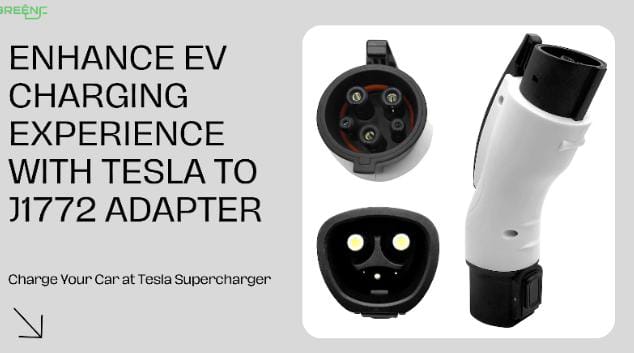
Tesla to J1772 adapter
In the ever-expanding world of electric vehicles (EVs), compatibility between charging standards is a crucial aspect of ensuring seamless charging experiences for users. The Tesla to J1772 adapter stands out as a key component in achieving this interoperability, allowing Tesla owners to connect to J1772 charging stations. This adapter not only exemplifies Tesla’s commitment to user convenience but also contributes to the broader goal of creating a more accessible and interconnected electric vehicle charging infrastructure.
Understanding the Charging Standards Landscape
The electric vehicle industry has witnessed the emergence of multiple charging standards, each championed by different manufacturers and organisations. Tesla, a pioneer in the EV market, initially developed its proprietary charging connector, which differs from the standardized J1772 connector widely adopted by other manufacturers and charging infrastructure providers. This divergence in standards raised concerns about interoperability and the need for a solution that would bridge the gap between Tesla vehicles and the broader charging network.
The Tesla to J1772 Adapter: A Technical Overview
The Tesla to J1772 adapter is a compact device designed to facilitate charging compatibility between Tesla vehicles and public charging stations that use the J1772 standard. On one end, the adapter features the Tesla connector, allowing Tesla owners to plug in their vehicles, while the other end interfaces with J1772 charging stations. This simple yet innovative solution enables Tesla drivers to access a more extensive network of public charging infrastructure, enhancing the overall practicality of owning a Tesla vehicle.
Enhancing Charging Accessibility for Tesla Owners
Tesla’s decision to create the Tesla to J1772 adapter reflects a commitment to user convenience and an acknowledgment of the growing importance of interoperability in the electric vehicle ecosystem. By providing Tesla owners with the means to connect to J1772 charging stations, the adapter expands the charging options available to them, especially in locations where Tesla-specific Supercharger stations may be less prevalent. This increased accessibility contributes to the broader goal of encouraging EV adoption by addressing the concerns of potential buyers regarding charging infrastructure availability.
Addressing Interoperability Challenges
The electric vehicle industry’s lack of standardized charging connectors has been a longstanding challenge. Tesla’s proprietary connector, while efficient within the Tesla Supercharger network, presented challenges for Tesla owners seeking to charge at non-Tesla charging stations. The Tesla to J1772 adapter serves as a pragmatic solution to this challenge, allowing Tesla vehicles to connect to the widely adopted J1772 standard. This move towards interoperability aligns with the industry’s broader efforts to create a cohesive and user-friendly charging experience for all EV owners.
User Experience and Convenience
The Tesla to J1772 adapter not only addresses technical interoperability but also enhances the overall user experience for Tesla owners. The compact and portable design of the adapter makes it easy for users to carry it in their vehicles, providing peace of mind and flexibility when planning longer journeys. With the adapter on hand, Tesla owners can confidently explore a more extensive network of charging stations, reducing concerns about range anxiety and making electric vehicles a more viable option for everyday use.
Deployment Challenges and Infrastructure Considerations
While the Tesla to J1772 adapter represents a significant step towards interoperability, challenges remain, particularly in the deployment of charging infrastructure. Not all charging stations support the J1772 standard, and in regions with limited charging infrastructure, Tesla owners may still face limitations in accessing public charging. However, as the electric vehicle market continues to grow, there is a growing incentive for charging station operators to support multiple standards, including J1772, fostering a more inclusive charging infrastructure.
Impact on EV Market Growth
The introduction of the Tesla to J1772 adapter has broader implications for the electric vehicle market as a whole. By breaking down barriers to charging accessibility, Tesla is contributing to the normalization of electric vehicle use. This move encourages more drivers to consider electric vehicles, knowing that they can rely on a more extensive network of public charging stations, regardless of the specific make or model of their vehicle.
Future Trends and Standardization Efforts
As the electric vehicle market continues to evolve, there is a growing recognition of the need for standardized charging connectors. Industry stakeholders are actively engaged in standardization efforts to create a more uniform and user-friendly charging infrastructure. Tesla’s decision to provide an adapter for J1772 reflects a pragmatic approach to the current state of charging standards, and it will be interesting to observe how future advancements in standardization impact the need for such adapters.
Conclusion: Advancing the Vision of Universal Charging
The Tesla to J1772 adapter exemplifies Tesla’s commitment to advancing the electric vehicle landscape. By addressing interoperability challenges and enhancing the charging experience for Tesla owners, this adapter plays a crucial role in creating a more accessible and interconnected charging infrastructure. As the industry moves towards standardization, the adapter serves as a practical solution, contributing to the broader vision of universal charging accessibility and driving the widespread adoption of electric vehicles



